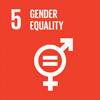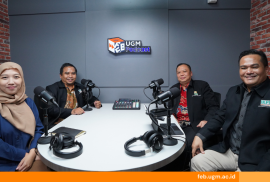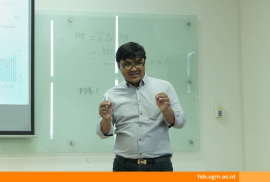
Corruption remains a significant issue faced by most countries worldwide, including Indonesia. Data from the Corruption Eradication Commission (KPK) shows that the goods and services procurement sector (PBJ) is one of the sectors most vulnerable to corruption. In fact, this sector accounts for approximately 30% of the state budget each year. Meanwhile, regulations governing PBJ often fail to prevent corrupt practices, leading to the phenomenon of state capture corruption.
This situation prompted two students from the Accounting Study Programme at the Faculty of Economics and Business, Universitas Gadjah Mada (FEB UGM), namely Martin Andini (Accounting 2023) and Ratri Dwiyanti (Accounting 2023), to conduct research entitled Social Audit: Solutions to State Capture Corruption and Forms of Increasing Transparency in Goods and Services Procurement in the E-Catalogue System. The two are part of the SOCA team, along with Muhammad Aditya Nugroho Sofyan (Politics and Governance 2023), Alfian Husni Mubarok (Heavy Equipment Management and Maintenance Engineering-SV 2023), and Wahyu Fajar Nur Rohim (Law 2023) conducted research under the guidance of Alfath Bagus Panuntun El Nur Indonesia, S.I.P., M.A., through the Student Creativity Programme in the Field of Social Humanities Research (PKM-RSH).
Ratri Dwiyanti explained that social audits could be a solution to the massive corruption in the PBJ sector. Public participation in PBJ oversight could deter perpetrators from committing corruption, as multiple parties would be involved in monitoring the process.
“Actually, the idea for social audits was inspired when Martin and I took a Government Accounting class. In one of the sessions, we discussed the phenomenon of state capture corruption and wondered whether this could be overcome with public participation, considering the large population of Indonesia,” said Ratri on Tuesday (21/10/2025) at FEB UGM.
The team interviewed various stakeholders who played four distinct roles: e-catalogue providers (LKPP), e-catalogue users (KemenPU, the DKI Jakarta Provincial Government, and Vendor Cakraw), e-catalogue supervisors (KPK, BPK, and BPKP), and social audit actors (ICW, TII, and researchers focusing on corruption issues). Their findings revealed that a lack of transparency remains one of the main problems in the e-catalogue system, creating opportunities for corruption to occur.
Ratri explained that social audits can help reduce corruption in the PBJ sector by promoting transparency throughout the implementation process. The interviewees also expressed their support for applying social audits to curb corruption. By involving the community, the practice can minimize corrupt behavior and strengthen public trust. However, Ratri emphasized the need to ensure the accuracy of complaint reports and to determine how much PBJ transaction data should be made public, considering that it includes personal information.
The team has produced a scientific article based on their findings, which will also serve as the foundation for a policy brief. They hope the policy brief will provide recommendations to policymakers, particularly those responsible for supervising and managing e-catalogue systems, to enhance existing regulations. Through this research, the students aim to foster optimism among Indonesians in the ongoing fight against corruption.
Source: Soca PKM-RSH Team
Editor: Kurnia Ekaptiningrum
Sustainable Development Goals










